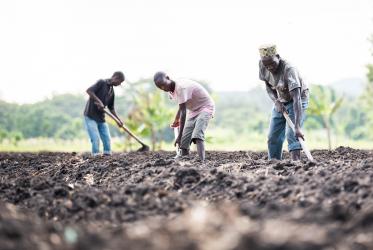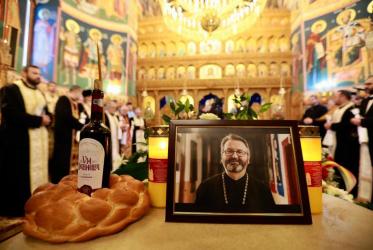“We see a lot of challenges, of frustration, anger, but also cases of good practices, of growing Romania together.” Speaking at a workshop on ”Food sovereignty and sustainable agriculture - the Romanian experience and the role of the church” at the German Kirchentag in Berlin on 25 May, ecumenical youth advocate Vicenţiu Dragoş Băşa from the Joint programme of the Romanian Orthodox Church and the World Council of Churches Ecumenical Advocacy Alliance, reflected on the work towards ensuring food security and sustainable agriculture in the Romanian context.
Romania is a unique ecological case, where out of a total of 23.8 million hectares, 28% is covered by forest and more than 60% is used for agriculture, primarily through smallholdings in the form of family farms.
Maria-Michaela Antonio, head of the Research Centre for Agriculture and Environment Protection at Lucian Blaga University in Sibiu, Romania, shed light on a number of the challenges facing local farming in Romania today, such as land use conversion, land abandonment, illegal logging and deforestation, but also challenges of a spiritual nature, where the loss of local identity can pose a threat to the sustainability of local communities.
“Here, the Church has a key role to play,” stressed theologian Ciprian Iulian Toroczkai from Lucian Blaga University. “Each priest is like a father for his community, and has a strong voice in the community,” said Toroczkai. “But we also see that the Church, being in the middle of society, has the power to transform whole communities, not only the human community, but also the community of nature. This also means that the Church can help preserve both the human heritage and the natural heritage.”
Seeing how large-scale industries form a challenge to the traditional agricultural structures of the Romanian context, Vicenţiu Dragoş Băşa reflected, “What we are really trying to do is to build and sustain communities. And even if this is in some ways a case of David against Goliath, we have seen examples where the Church, the educational system and the government can work and take action together.”
“All things are possible for one who believes,” said Băşa, quoting Mark 9:23.
Archpriest Dr Daniel Buda, WCC programme executive for Church and Ecumenical Relations, concluded, ”looking at the bigger picture of the ecumenical movement, we know that the World Council of Churches has a long tradition of accompanying and supporting development work, and that the Romanian churches expect us to be present also in this area.”
”But at the same time, I think the Romanian situation, where the churches work well together and where there are joint projects for development, can serve as an example also for churches in other parts of the world. This way, the WCC and the Romanian member churches can be of great mutual usefulness.”
Food for Life Campaign, of the World Council of Churches Ecumenical Advocacy Alliance







